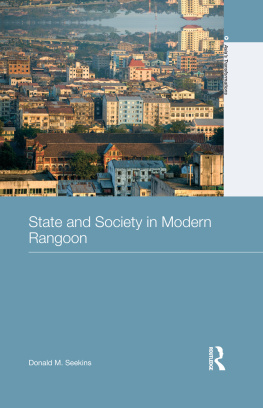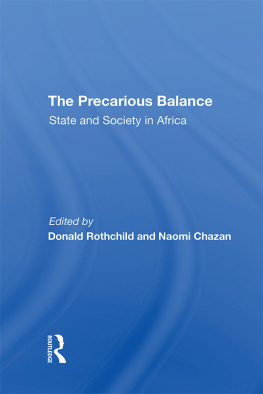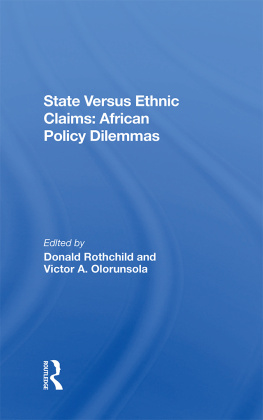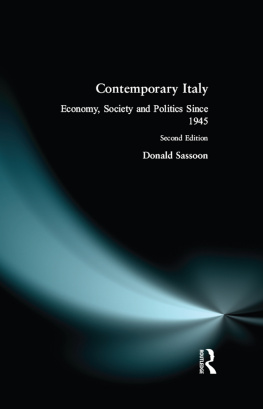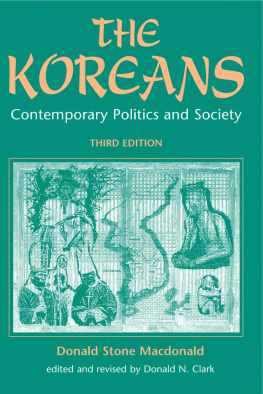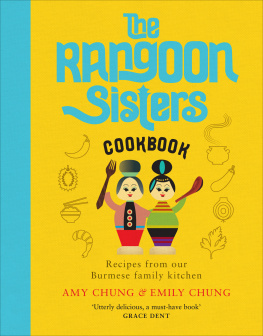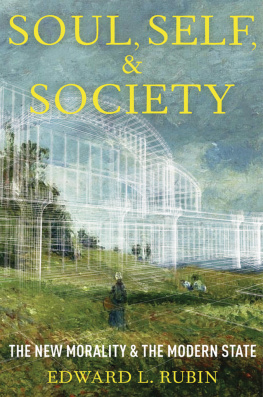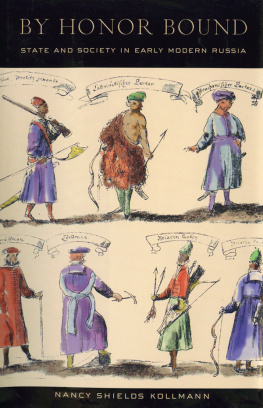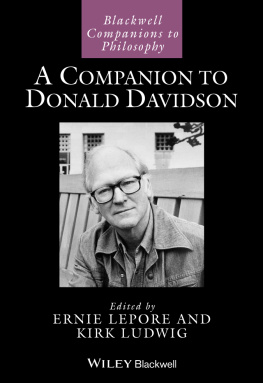State and Society in Modern Rangoon
While most of Asias major cities are increasingly homogenized by rapid economic growth and cultural globalization, Rangoon, which is Burmas former capital and largest city, still bears the imprint of a unique and often turbulent history. It is the site of the Shwedagon Pagoda, a focus of Buddhist pilgrimage and devotion since the early second millennium CE that continues to play a major role in national life. In 1852, the British occupied Rangoon and made it their colonial capital, building a modern port and administrative center based on Western designs. It became the capital of independent Burma in 1948, but in 2005 the State Peace and Development Council military junta established a new, heavily fortified capital at Naypyidaw, 320 kilometers north of the old capital.
A major motive for the capital relocation was the regimes desire to put distance between itself and Rangoons historically restive population. Reacting to the huge anti-government demonstrations of Democracy Summer in 1988, the new military regime used massive violence to pacify the city and sought to transform it in line with its supreme goal of state security. However, the Saffron Revolution of September 2007 showed that Rangoons traditions of resistance reaching back to the colonial era are still very much alive.
Donald M. Seekins is Professor of Southeast Asian Studies at Meio University in Okinawa, Japan, and has been researching the contemporary politics and society of Burma since 1988. His books include The Disorder in Order: The Army-State in Burma since 1962 (2002), The Historical Dictionary of Burma (Myanmar) (2006) and Burma and Japan since 1940: From Co-Prosperity to Quiet Dialogue (2007).
Asias Transformations
Edited by Mark Selden, Cornell University, USA.
The books in this series explore the political, social, economic and cultural consequences of Asias transformations in the twentieth and twenty-first centuries. The series emphasizes the tumultuous interplay of local, national, regional and global forces as Asia bids to become the hub of the world economy. While focusing on the contemporary, it also looks back to analyse the antecedents of Asias contested rise.
This series comprises several strands:
Asias Transformations
Titles include:
Debating Human Rights*
Critical essays from the United States and Asia
Edited by Peter Van Ness
Hong Kongs History*
State and society under colonial rule
Edited by Tak-Wing Ngo
Japans Comfort Women*
Sexual slavery and prostitution during World War II and the US occupation
Yuki Tanaka
Opium, Empire and the Global Political Economy*
Carl A. Trocki
Chinese Society*
Change, conflict and resistance
Edited by Elizabeth J. Perry and Mark Selden
Maos Children in the New China*
Voices from the Red Guard generation
Yarong Jiang and David Ashley
Remaking the Chinese State*
Strategies, society and security
Edited by Chien-min Chao and Bruce J. Dickson
Korean Society*
Civil society, democracy and the state
Edited by Charles K. Armstrong
The Making of Modern Korea*
Adrian Buzo
The Resurgence of East Asia*
500, 150 and 50 year perspectives
Edited by Giovanni Arrighi, Takeshi Hamashita and Mark Selden
Chinese Society, second edition*
Change, conflict and resistance
Edited by Elizabeth J. Perry and Mark Selden
Ethnicity in Asia*
Edited by Colin Mackerras
The Battle for Asia*
From decolonization to globalization
Mark T. Berger
State and Society in 21st Century China*
Edited by Peter Hays Gries and Stanley Rosen
Japans Quiet Transformation*
Social change and civil society in the 21st century
Jeff Kingston
Confronting the Bush Doctrine*
Critical views from the Asia-Pacific
Edited by Mel Gurtov and Peter Van Ness
China in War and Revolution, 18951949*
Peter Zarrow
The Future of USKorean Relations*
The imbalance of power
Edited by John Feffer
Working in China*
Ethnographies of labor and workplace transformations
Edited by Ching Kwan Lee
Korean Society, second edition*
Civil society, democracy and the state
Edited by Charles K. Armstrong
Singapore*
The State and the culture of excess
Souchou Yao
Pan-Asianism in Modern Japanese History*
Colonialism, regionalism and borders
Edited by Sven Saaler and J. Victor Koschmann
The Making of Modern Korea, second edition*
Adrian Buzo
Re-writing Culture in Taiwan
Edited by Fang-long Shih, Stuart Thompson, and Paul-Franois Tremlett
Reclaiming Chinese Society*
The new social activism
Edited by You-tien Hsing and Ching Kwan Lee
Girl Reading Girl in Japan
Edited by Tomoko Aoyama and Barbara Hartley
Chinese Politics*
State, society and the market
Edited by Peter Hays Gries and Stanley Rosen
Chinese Society, third edition*
Change, conflict and resistance
Edited by Elizabeth J. Perry and Mark Selden
Mapping Modernity in Shanghai
Space, gender, and visual culture in the Sojourners City, 185398
Samuel Y. Liang
Minorities and Multiculturalism in Japanese Education
An interactive perspective
Edited by Ryoko Tsuneyoshi, Kaori H Okano and Sarane Boocock
Japans Wartime Medical Atrocities
Comparative inquiries in science, history, and ethics
Edited by Jing-Bao Nie, Nanyan Guo, Mark Selden and Arthur Kleinman
State and Society in Modern Rangoon
Donald M. Seekins
Asias Great Cities
Each volume aims to capture the heartbeat of the contemporary city from multiple perspectives emblematic of the authors own deep familiarity with the distinctive faces of the city, its history, society, culture, politics and economics, and its evolving position in national, regional and global frameworks. While most volumes emphasize urban developments since the Second World War, some pay close attention to the legacy of the longue dure in shaping the contemporary. Thematic and comparative volumes address such themes as urbanization, economic and financial linkages, architecture and space, wealth and power, gendered relationships, planning and anarchy, and ethnographies in national and regional perspective. Titles include:
Bangkok*
Place, practice and representation
Marc Askew
Representing Calcutta*
Modernity, nationalism and the colonial uncanny
Swati Chattopadhyay
Singapore*
Wealth, power and the culture of control
Carl A. Trocki
The City in South Asia
James Heitzman
Global Shanghai, 18502010*
A history in fragments
Jeffrey N. Wasserstrom
Hong Kong*
Becoming a global city
Stephen Chiu and Tai-Lok Lui
Asia.com
Asia.com is a series which focuses on the ways in which new information and communication technologies are influencing politics, society and culture in Asia. Titles include:
Japanese Cybercultures*
Edited by Mark McLelland and Nanette Gottlieb
Asia.com*
Asia encounters the Internet
Edited by K. C. Ho, Randolph Kluver
and Kenneth C. C. Yang

